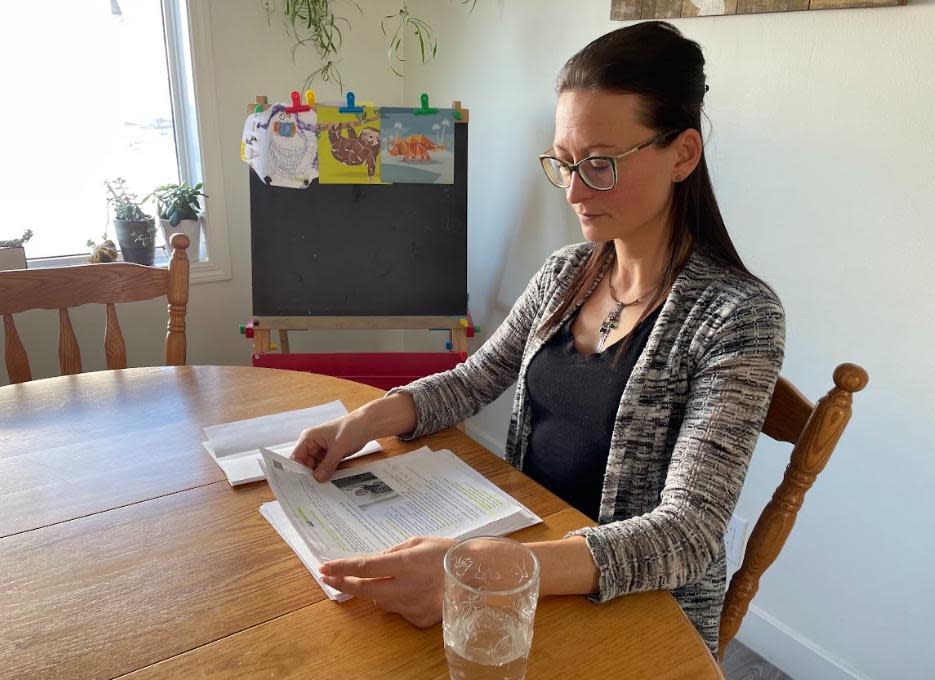Years-long wait for autism diagnosis hurts her child and school system, single mom says

In retrospect, Michelle Kramer says, there were early signs that her seven-year-old son might have autism, but she never anticipated how difficult those early challenges would be for her as a parent once her child entered school.
After five years, she's still waiting for an assessment to confirm what she's suspected from his toddler years.
"He was late to talk and late to walk … He didn't call me 'mom' for the longest time, so I didn't feel connected to him," Kramer said in an interview with CBC News.
"And he was constantly pinching. He would do these repetitive motions when he was trying to find the words to learn to talk."
When her son started school, those differences were pulled into sharp focus.
The ongoing changes of new classes, teachers and situations would lead him to feel overwhelmed. In turn, he would act out or become violent, causing the school to call her.
"I wasn't able to always come pick him up because they were just calling all the time," Kramer said. "I felt so spread thin and pulled in these different directions."
As a result, she says, she's had to cut down her work schedule and take on part-time hours.
On Tuesday, Official Opposition Leader Carla Beck held a news conference in Moose Jaw with several parents, bringing attention to the issue of students with autism missing multiple days of school due to a lack of support in the classroom.
"We're in this crisis because [Premier] Scott Moe and the Sask Party has cut per-pupil funding for the better part of a decade," she said. "The impact has been huge. It's meant less teachers, less supports and less opportunities for our kids."
Hundreds of children waiting for autism assessments
Kramer says she turned to Child and Youth Services five years ago to get her child assessed for autism spectrum disorder, but it's been nearly impossible to get answers to her questions.
"Nobody would call me. I called for months and months and months," she said, noting the school was able to provide documentation of her son's difficulties, which helped her finally get on a two-year waitlist for assessment, now slated to happen in 2025.
The Ministry of Health has confirmed that slightly more than 1,700 children and youth under the age of 18 are currently waiting for an assessment through public services.
Complex needs a sticking point in bargaining
Students' increasingly complex needs have been identified as one of the major sticking points in teachers' bargaining talks with the provincial government.
The Saskatchewan Teachers' Federation has commenced job action with rotating strikes that began last week as the federation argues for classroom complexity to be addressed as part of those negotiations.
Education Minister Jeremy Cockrill has been steadfast in saying that issue doesn't belong at the bargaining table, but rather should be individually addressed by Saskatchewan's 27 school divisions.
"That's a line in the sand for the government that we're not going to be moving on," he told reporters last month.
The Ministry of Education states that it is providing $20 million to school divisions to hire staff to respond to classroom complexity, which can be used to hire teachers, educational assistants, speech language pathologists, counsellors, educational psychologists or other supports.
Funding isn't tied to medical diagnoses of students, but rather "school divisions have the responsibility to make staffing and programming decisions within their allocated budget" to meet priorities, a spokesperson for that department said in an emailed statement.
However, some school divisions in Saskatchewan require documentation from a third-party, such as a physician, to determine the extra support a student needs in the classroom.
Expert sees impact of disruptive behaviour
A board-certified behaviour analyst says she commonly sees students with autism or suspected autism having to leave class due to disruptive behaviour.
"We're putting a lot of pressure on people like teachers and educational assistants to manage these classrooms where … the needs are so diverse," said Shannon Hill, who noted she's hearing parents tell her that their children's needs are not being met in the classroom.
"That's not the teachers' fault," she said, adding the issue is finding out how to serve students' individual needs.
She herself knows the challenges of parents of neurodiverse children — her 22-year-old son has a cognitive disability and autism that was only diagnosed when he was seven.

Shannon Hill, a board-certified behavioural analyst who works with children who have autism, says her work was inspired by her now adult son, Colby, who was diagnosed with autism when he was seven. (Submitted by Shannon Hill)
"It was the frustration that I had trying to work with him and not having the knowledge to do what needed to be done," she said.
His life and schooling changed for the better when he started going to a functional life skills class, where he met friends and had specialized programming, she says.
The Saskatchewan government has announced a pilot program offering specialized supports to eight urban schools,, which Hill says offers some hope.
"I think it needs to be expanded immensely," she said, noting there's still a lot of uncertainty over how long the pilot project will last and how success will be measured: "What kind of data are we going to derive from this small group of kids for a period of time?"
The goal should be to provide early intervention and specialized support for children in a way that meets their learning needs, she says.
Cost of private services prohibitive for single mom
While some children can find support through private services, Kramer says that's not possible for her. She's learned it would cost her more than $3,000 to have her son privately assessed for autism, which she said is out of reach for her as a single mother with a part-time job.
In the meantime, Kramer says, she can see the effort the staff and her son's school is making to meet her child's needs.
"They're doing way more than what's expected of them in order to have him stay at the school so that I can go to work," she said.
In her mind, the recent teacher strikes are not just about teachers' needs but about those of families like hers.
"I have no shame. I need help. And so why are we not supporting families as a society?" Kramer asked. "That's really sad and that's really what this is about."
Tell us what you think about teacher job action:
